

The Secret History of Muslims in the U.S. Watch: How people respond to Bible quotes when told they're from the Quran. People make a lot of assumptions about Islam compared with Christianity and Judaism — particularly that it's more inherently violent.

But do people really know what they're talking about, or are they simplifying complicated belief systems to make a political point? The team at Dit Is Normaal decided to put this to the test in the Netherlands, where they're based. So they disguised a Bible as a Quran, read verses from the Bible (such as "You will have to cut off her hand"), and asked people for their thoughts. People by and large reacted with a lot of "othering" of Muslims — making remarks like, "If you've been raised with this book and these kinds of thoughts, it's going to influence the way you think.
" Judaism: Founder, Beliefs & Facts. Judaism is the world’s oldest monotheistic religion, dating back nearly 4,000 years.

Followers of Judaism believe in one God who revealed himself through ancient prophets. The history of Judaism is essential to understanding the Jewish faith, which has a rich heritage of law, culture and tradition. Judaism Beliefs Jewish people believe there’s only one God who has established a covenant—or special agreement—with them. Their God communicates to believers through prophets and rewards good deeds while also punishing evil. Most Jews (with the exception of a few groups) believe that their Messiah hasn’t yet come—but will one day. Jewish people worship in holy places known as synagogues, and their spiritual leaders are called rabbis. Today, there are about 14 million Jews worldwide. Buddhism - Definition, Founder & Origins. Buddhism is a faith that was founded by Siddhartha Gautama (“the Buddha”) more than 2,500 years ago in India.
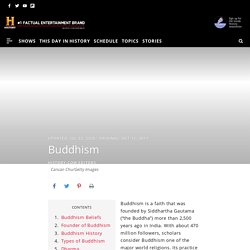
With about 470 million followers, scholars consider Buddhism one of the major world religions. Its practice has historically been most prominent in East and Southeast Asia, but its influence is growing in the West. Many Buddhist ideas and philosophies overlap with those of other faiths. Buddhism Beliefs Some key Buddhism beliefs include: Followers of Buddhism don’t acknowledge a supreme god or deity. Founder of Buddhism. Hinduism - Origins, Facts & Beliefs. Hinduism is the world’s oldest religion, according to many scholars, with roots and customs dating back more than 4,000 years.
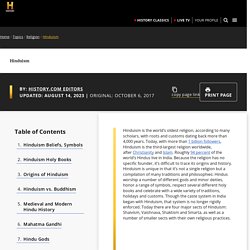
Today, with about 900 million followers, Hinduism is the third-largest religion behind Christianity and Islam. Roughly 95 percent of the world’s Hindus live in India. Because the religion has no specific founder, it’s difficult to trace its origins and history. Hinduism is unique in that it’s not a single religion but a compilation of many traditions and philosophies. Hinduism Beliefs Some basic Hindu concepts include: Hinduism embraces many religious ideas. Hinduism Symbols. Christianity - Dogma, Definition & Beliefs. Christianity is the most widely practiced religion in the world, with more than 2 billion followers.
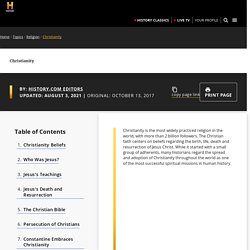
The Christian faith centers on beliefs regarding the birth, life, death and resurrection of Jesus Christ. While it started with a small group of adherents, many historians regard the spread and adoption of Christianity throughout the world as one of the most successful spiritual missions in human history. Christianity Beliefs Some basic Christian concepts include: Christians are monotheistic, i.e., they believe there’s only one God, and he created the heavens and the earth. Who was Jesus? Most historians believe that Jesus was a real person who was born between 2 B.C. and 7 B.C. According to the text, Jesus was born to a young Jewish virgin named Mary in the town of Bethlehem, south of Jerusalem in modern-day Palestine. Very little is known about Jesus’s childhood. Jesus was raised Jewish, and according to most scholars, he aimed to reform Judaism—not create a new religion.
Jesus’s Teachings. How Muslims, Often Misunderstood, Are Thriving in America. This story appears in the May 2018 issue of National Geographic magazine.
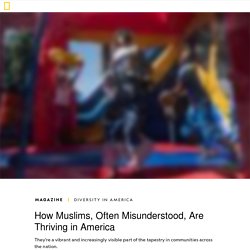
This story is part of Diversity in America, a National Geographic series covering racial, ethnic, and religious groups and examining their changing roles in 21st-century life. Tell us your story with #IDefineMe. There was nothing to do but watch as the copper-domed building in the southern Texas oil town of Victoria burned down. The mosque where Abe Ajrami’s Beyoncé-loving daughter was feted with other high school graduates, the mosque where his children went to religion classes, the mosque where he and his family went every Friday to pray and mingle over a potluck of seven-layer dip and spiced biryani, was gone.
“I was trying not to break down,” says Ajrami, a Palestinian American who raced to the mosque after getting a phone call in the dead of night. This family reminds me of my own. Born to a poor family in the Gaza Strip, Ajrami studied nursing because it was all he could afford. History Detectives. When the first Muslims came to the land that would become the United States is unclear.

Many historians claim that the earliest Muslims came from the Senegambian region of Africa in the early 14th century. It is believed they were Moors, expelled from Spain, who made their way to the Caribbean and possibly to the Gulf of Mexico. When Columbus made his journey to the United States, it is said he took with him a book written by Portuguese Muslims who had navigated their way to the New World in the 12th century. History Detectives. Muslims and Islam: Key findings in the U.S. and around the world. Try our email course on Muslims and Islam Learn about Muslims and Islam through four short lessons delivered to your inbox every other day.Sign up now!
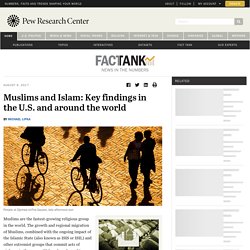
Muslims are the fastest-growing religious group in the world. The growth and regional migration of Muslims, combined with the ongoing impact of the Islamic State (also known as ISIS or ISIL) and other extremist groups that commit acts of violence in the name of Islam, have brought Muslims and the Islamic faith to the forefront of the political debate in many countries.
Yet many facts about Muslims are not well known in some of these places, and most Americans – who live in a country with a relatively small Muslim population – have said they know little or nothing about Islam. Here are answers to some key questions about Muslims, compiled from several Pew Research Center reports published in recent years: How many Muslims are there? Islam - Five Pillars, Nation of Islam & Definition.